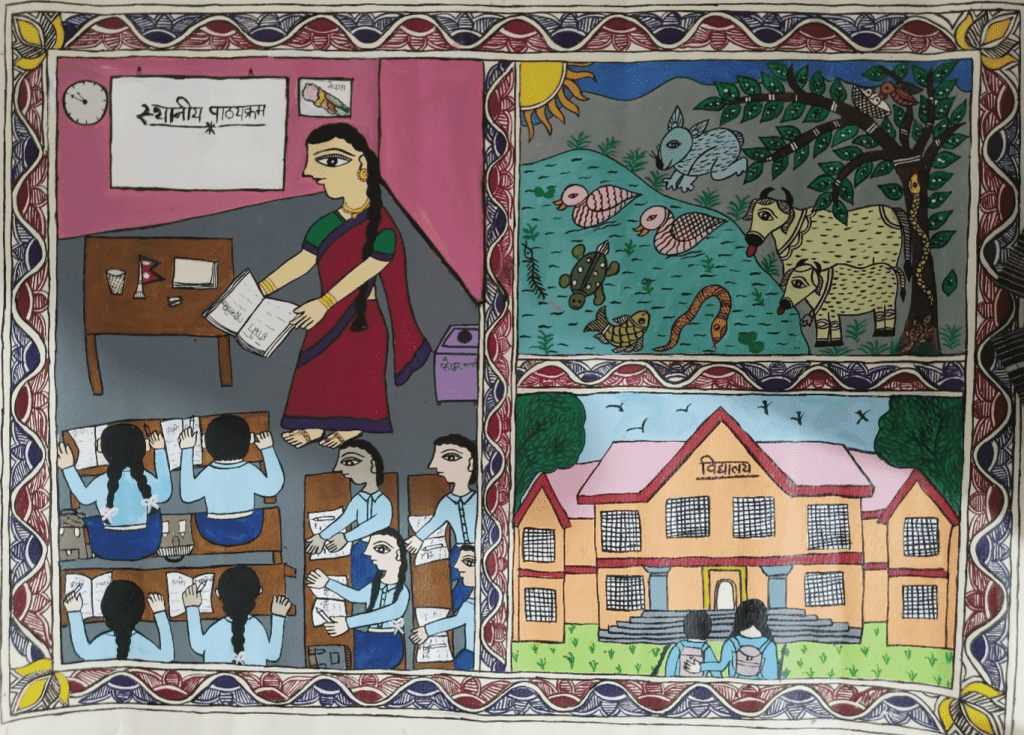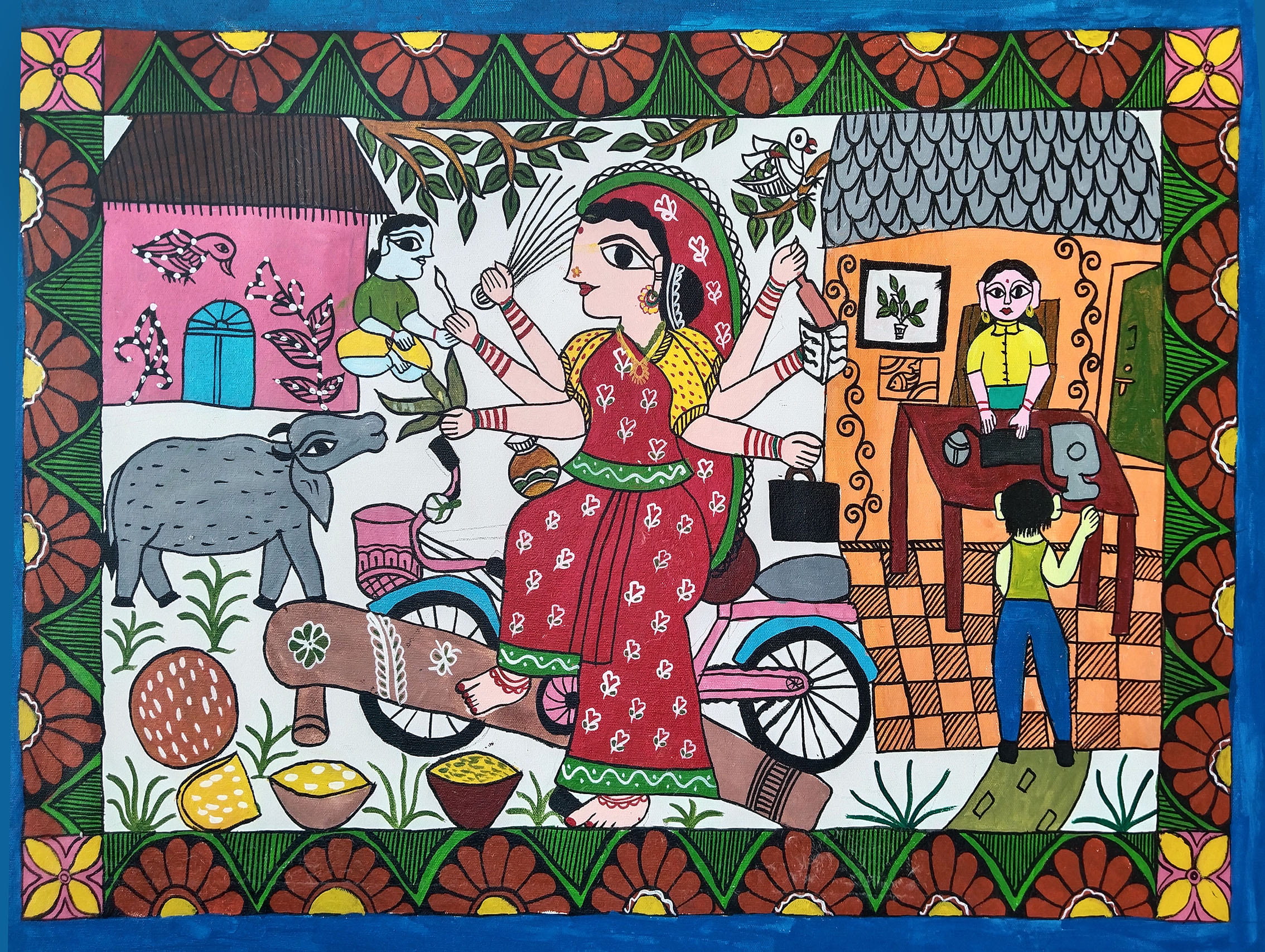Latest posts
- Curricula: Mithila art-focused local curriculum in Nepal 2 July 2025
- Register now: MAP International Online Conference 2025 1 June 2025
- Policy brief: Gira Ingoma book and policy brief: “The Culture We Want, for the Woman We Want” 28 November 2024
- Manuals and toolkits: GENPEACE Children’s Participation Module in the Development Process 13 November 2024
- Journal article: [Working Paper] Gira Ingoma – One Drum per Girl: The culture we want for the woman we want 30 October 2024
- Curricula: Beyond Tradition: Psychosocial Model 30 October 2024
- Curricula: Beyond Tradition Module: Revitalizing Lenong as a Model for Teaching Betawi Arts 30 October 2024
- Curricula: Beyond Tradition: Lenong Revitalisation as a Model for Teaching Betawi Cultural Arts 30 October 2024
- Beyond Tradition Lenong Performance “RAWR…! Kite Kagak Takut” 30 October 2024
- Journal article: [Working Paper] Facing Heaven – Déuda Folklore & Social Transformation in Nepal 30 October 2024
- Curricula: Building Community Curriculums 24 October 2024
- The Magic of Theatre Project Documentary 24 October 2024
Creating a Mithila Art Focused Local Curriculum in Nepal: An Introduction
- Advocating for progressive education
Author

The JWAS team with the executives of Laxminiya rural municipality. Photo- Credit: Chandan Jha
Project introduction
Janaki Womens Awareness Society (JWAS), a non-governmental organization (NGO) in Nepal, has received funds from the University of Lincoln/Mobile Arts for Peace (MAP) for creating a Mithila art local curriculum in the Laxminiya rural municipality of Dhanusha district, Madhesh province, Nepal.
JWAS has applied an inclusive approach to gather information from a diverse range of people, communities and stakeholders. The information is being collected through meetings, workshops and interviews. A team of education experts, young Mithila artists, senior Mithila artists, local young people and teachers are contributing towards the project. Altogether nine major themes have been identified, and categorised accordingly.

A discussion with the retired teachers in Laxminiya rural municipality. Photo Credit: Binay Jha
Document review
Nepal’s national curriculum framework (NCF), 2019 (second edition) and basic education curriculum (BEC) 2022 outline the need to include one additional local subject in the basic school curriculum. The Curriculum Development Centre (CDC) Nepal has also published Textbook Development and Distribution Guidelines (2022), and an orientation Manual for Local Curriculum Development (OMLCD) in 2020, which provide information on how to prepare local curriculum. The authority to create local curriculums, according to the constitution of Nepal (2015), is delegated to the 753 local governments. This has been set out in Schedule 8 of the constitution, which includes the management of basic and secondary education. The Local Government Operation Act (LGOA) 2017 (article 11-JA, sub article 1 and 18) further elaborates the roles of local governments in formulating education plans and policies for the promotion, protection, and preservation of local knowledge, skills, language, and technologies.
The Constitution of Nepal encourages the inclusion of Non-Governmental Organisations (NGOs) to meet the national needs and priorities (article 51, J). OMLCD has stated that local government can coordinate with NGOs for the preparation of local curriculum. Despite the efforts of the government for the promotion of local curriculum, many local governments, including Laxminiya rural municipality, have not yet prepared locally created curriculums.
Evidence from JWAS suggests that local knowledge is imperative, and can be taught through local curriculums. Research conducted by JWAS in 2023 revealed that some of the elected women leaders in local governments lack the knowledge of their local contexts (Bhandari et al., 2023). Not all local Women leaders are familiar with the histories, diverse cultures and range of gender issues in their respective municipality. This is therefore one of the reasons to develop a local curriculum on Mithila’ arts that will showcase the role of women and girls and help to develop the leadership abilities of local women leaders.
A roundtable meeting organised in Nepal in September 2023 by MAP and UNESCO, emphasised the need to prepare an arts based curriculum (at a local and national level). Similarly Bhandari (2022) states the need to develop a new arts-based curricula for teaching civic national values, peace, and mutual respect for sustaining democracy in Nepal, encouraging CSOs to be engaged in the process.
Introduction of Mithila art
Mithila art has traditionally been passed from mothers to daughters (from older generations to younger generations), and is very popular in the ancient Mithila region (presently Madhesh province in Nepal). Traditionally, it was used in religious rituals, festivals and ceremonies. But nowadays, people have started using it for creating awareness on different social issues, for example ending child marriage and improving harmful social norms.
In this project, JWAS is working with both young and adult Mithila artists/painters to inform the local curriculum. Through a workshop with the local Mithila artists in Laxminiya rural municipality, ideas and draft session plans have been generated to prepare grade specific lesson plans. These lesson plans will serve as an annex in the local curriculum and will be published separately, each building upon each other: starting with understanding the form and resources used through to how adaptations can be made.
Approximately 5000 students from 18 schools in Laxminiya rural municipality will benefit from the local curriculum. Furthermore, the curriculum will serve as an example for an art focused local curriculum in Nepal, particularly in the Madhesh province, central southern region in Nepal.
* The next article briefly explores the process being applied in the project.

An illustrative Mithila art painting to introduce the Mithila art curriculum. Credit: Ruby Pathak and team
References
Bhandari, N.R. & Moncrieff, M.L. (2022). Decolonising curriculum knowledge using arts based approaches for teaching and learning civic education with young people in Nepal. In Moncrieffe. M. L. (Eds.). Decolonising Curriculum Knowledge: International Perspectives and Interdisciplinary Approaches. London: Palgrave MacMillan.
Bhandari, N.R., Dhakal, B., Kattel, D. & Khadka, R. (2023). Gender norms in local government: how they shape engagement for women leaders in Nepal. JWAS: Nepal. Available at https://www.alignplatform.org/resources/gender-norms-local-government-how-they-shape-engagement-women-leaders-nepal

